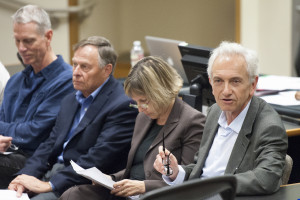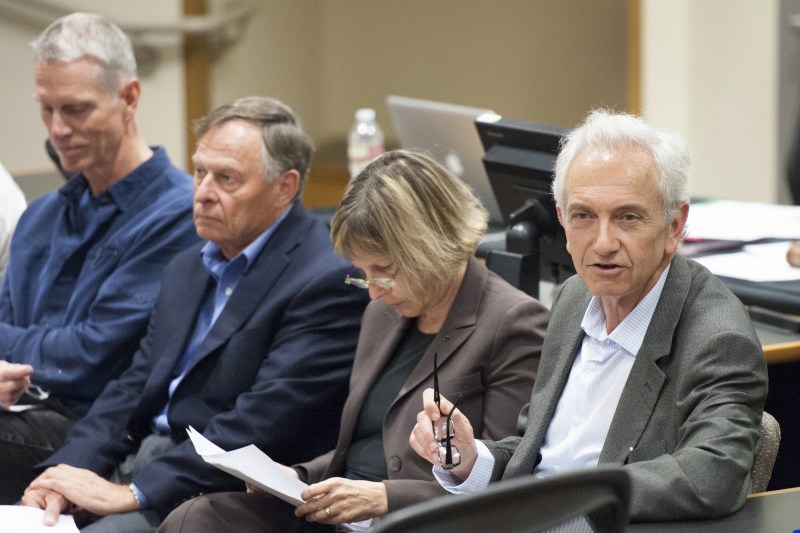The Faculty Senate heard a report from a panel of faculty members on the future of the Ph.D. degree at its meeting on Thursday.

Senate Chair Raymond Levitt M.S. ’73 Ph.D. ’75, professor of civil and environmental engineering, opened the meeting by congratulating six faculty members newly elected to the National Academy of Sciences.
The subsequent panel discussion featured Professor of Philosophy Debra Satz, Professor of Engineering Jim Plummer M.S. ’67 Ph.D. ’71, Professor of Biology Bob Simoni, Professor of Political Science Josiah Ober and Professor of Biochemistry Daniel Herschlag.
According to Russell Berman, professor of German and comparative literature and the discussion’s moderator, the panel was intended to launch a discussion about the future of the Ph.D. program that would serve as a starting point for further deliberation.
“We wanted to frame some of the issues that could be part of the discussion for next year’s session,” Berman said.
Berman opened the presentation by discussing critical aspects of current Ph.D. programs in the humanities, including an increasing recognition — in some quarters — of the breadth of careers options available beyond academia for Ph.D. students.
“For many grad students, there’s an assumption that faculty look at certain alternative careers with disdain,” he acknowledged. “Some students don’t want their advisors to know they are considering that path.”
Berman noted the importance of assessing the internal structure of the humanities’ Ph.D. programs.
“Are we preparing our students appropriately for the career options they’ll have?” he asked. “To what extent do we provide appropriately broadened professional development opportunities? … I think we do that well at Stanford, but are we doing enough and are we doing what’s appropriate?”
Berman also emphasized the importance of developing hard data over a long time period on students’ post-graduation entry into various careers.
Satz agreed with many of Berman’s points and reflected on a study conducted by the School of Humanities and Sciences on the doctoral Class of 2002’s employment 10 years after graduation.
“Roughly 50 to 60 percent [of the students] were in academic careers,” Satz said. “But we couldn’t find a lot of the others. We need to do more research because we need to know if we are serving those students well and how satisfied they are with their training.”
According to Satz, many humanities students are confused by the job market and are unsure about their ability to apply their degrees in fields beyond academia.
“We need to know what’s happening to our students,” she said. “We need to have a discussion about what the Ph.D.’s for.”
Plummer subsequently spoke about the happiness of School of Engineering faculty with the state of the Ph.D. program. According to Plummer, roughly 80 percent of the School’s doctoral graduates go into industry.
“[That] is not surprising given where we are, in the Silicon Valley,” Plummer reflected. “We have the opposite problem of many other departments on campus: that too few of our students don’t want to go on to academic careers.”
According to Ober, the Department of Political Science has seen both an increasing number of applicants and an increased yield among admits, creating an increasingly selective program whose graduates have largely obtained satisfactory employment.
“Virtually all of the students [are] getting placement, although sometimes it takes a couple of years,” he said. “About half go into research and the other half into teaching at universities or think tanks.”
“I’d like to get a better sense of why students seek admission to a Ph.D. program in the first place,” Ober added. “We need a sense of how their thinking evolves about their aspirations<\p>…<\p>and how they think about the value of the Ph.D. in later years. We need to get a better and more detailed accurate university-funded data set that would allow us to track evolving student career ambitions and be able to make adjustments to the Ph.D. program that can best serve the students and society.”
Simoni spoke about the strength of the Biology Department’s Ph.D. program, drawing attention to a high number of applications. He also noted recent changes to the biology curriculum, including the introduction of “micro” or “mini” courses lasting less than the duration of a quarter.
“The unit of course time is much smaller, which allows them to do more in a quarter,” he elaborated. “It becomes more focused and concentrated and gives a lot of flexibility.”
According to Herschlag, the School of Medicine aims “to tell students that they should be seeking a career of their choice … We should be training them for existing jobs and also training them to find and create new paths.”
Herschlag criticized undergraduate education in the life sciences, saying it discourages aspiring graduate students from taking risks.
“They would fail as graduate students,” Herschlag said. “We are trying to put in place radically different models that are more interactive and collaborative, with hands-on problem solving, to better train our students.”
The panel presentation was followed by a wider faculty discussion.
Andrea Goldsmith, professor of electrical engineering, expressed concern about focusing the Ph.D. program too much on career paths.
“This discussion should be about an education, about a broadening of horizons, that transcends engineering, science [and] the humanities,” she said.
However, Herschlag reiterated the broader issue of students being unaware of different careers made accessible by their education.
“It’s not necessarily that you’re getting a vocational training,” he said. “It is to help allay the fears of students.”
